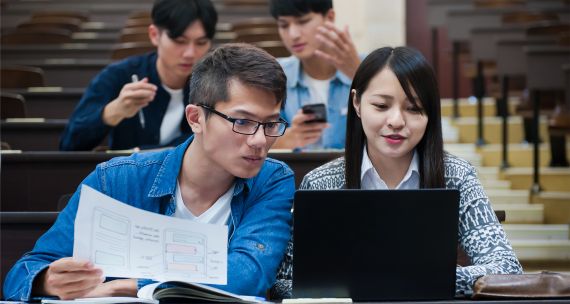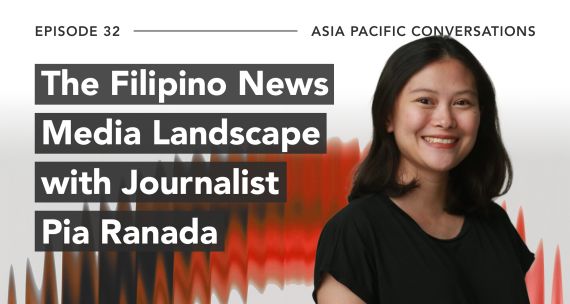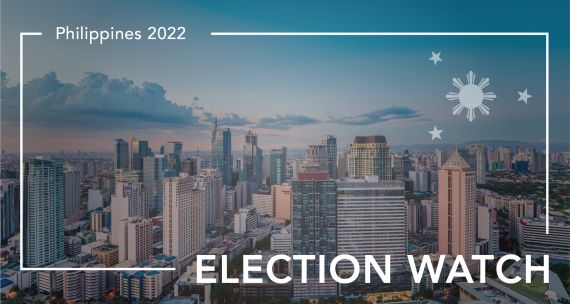Corruption and the South China Sea are two issues animating the lead-up to the Philippines presidential election on May 9, 2016.
The Asia Pacific Foundation of Canada recently convened a Philippines ‘election watch’ of nine university students in Vancouver. The group’s goal is to learn from and inform others about the election, the candidates and the issues that are most pressing for voters.
'Korap'-tion in the Philippines
“Kung walang korap, walang mahirap!” (“If no one is corrupt, no one will be poor!”) was the slogan that President Benigno S. Aquino III used when he was running for president in 2010. With only a week to go before the next general election in the Philippines, the incumbent president has just about run out of time to prove that his administration is capable of winning the fight against corruption.
A recent Manila Standard poll shows that Filipinos consider corruption the most important issue in this year’s presidential election, rating 31%, ahead of poverty at 15%, drug addiction and illegal drugs at 14% and unemployment at 10%. Surprisingly — given Metro Manila’s legendary traffic problems — traffic ranked lowest, at only 1%.
So what are the candidates telling the voters about what they will do to fight corruption?
The current front-runner presidential candidate, Senator Grace Poe, expressed her support for and praised President Aquino’s efforts to curb corruption, and promised to continue his anti-corruption work. Similarly, Mar Roxas, a presidential candidate from the Liberal Party, and presidential candidate Senator Miriam Defensor Santiago of the People Reform Party, both vow to fight corruption and promise strict regulations and tight implementation of anti-corruption laws. Davao City Mayor and presidential contender Rodrigo Duterte has vowed to be a harsh leader in his own fight to stop corruption and illegal drugs (despite the present drug accusations against his own son, Paolo Duterte). Meanwhile, after having repeatedly declined to attend court hearings, current Vice President Jejomar Binay of the Koalisyon ng Daang Matuwid (Coalition of the Straight Path) still faces corruption allegations. Despite the support for this other top contender, it is too soon to say if the legal irregularities will deter his voters from supporting his campaign.
In a poll by The Standard newspaper in the Philippines taken on December 2015, Metro Manila was cited as the area most concerned with corruption, at 38% of voters, followed by South Luzon and Bicol (both with 33%) North/Central Luzon (30%) and Visayas (29%). According to the poll, Mindanao in the south was less concerned with corruption, with 28%.
The third leg of the nationally-televised PiliPinas Debates 2016 series administered by the Commission on Elections (COMELEC) came to a close April 24 leaving room for more anticipation, sheer excitement and some unanswered questions. From the first debate leg in the region of Cagayan de Oro to the last leg at the University of Pangasinan, Filipinos have discovered the heightened need to curb corruption. Now that the country has had the opportunity to hear from the presidential candidates, the remaining days before the election will reveal which candidate has the skills to prove to voters the seriousness and credibility of their presidential platform against corruption.
South China Sea
Rising tensions between the Philippines and China over their overlapping claims in the South China Sea are putting the presidential candidates in a tricky situation. Sovereignty over the disputed area and in particular two island chains – the Paracels and the Spratlys – is claimed by a number of neighbouring countries, including China, the Philippines, Vietnam, Brunei and Malaysia. Although largely uninhabited, these islands may have reserves of natural resources. The maritime region is also a major shipping route, with an estimated US$5.3 trillion of trade passing through each year, and is also home to a fishing industry that supplies the livelihoods of people across the region.
China claims by far the largest portion of the territory, and formulates its argument around historic rights and legal claims, whereas the Philippines justifies its claims based on its geographical proximity to the Spratlys Island.
In January 2013, Manila announced it was taking China to a UN tribunal under the auspices of the UN Convention on the Laws of the Sea (UNCLOS) to challenge its claims. In October 2015, the U.S. sailed a destroyer equipped with guided missiles within 12 nautical miles of the artificial islands — the first in a series of actions planned to assert freedom of navigation in the region. The U.S. serves as the principal regional security guarantor and its allies around the South China Sea look to the U.S. to maintain free trade, secure lines of communication, and stability in the region.
So what do the presidential candidates say about this issue?
Senator Grace Poe, the front-runner, said that Chinese military superiority and aggression should not make the Philippines acquiesce, and she promised to invest heavily in the Philippines military if elected.
Mayor Rodrigo Duterte blamed the U.S. for allowing China to infringe on the Philippines’ maritime territory, although he also said his military focus would be mainly domestic, promising to wipe out the extremist groups in the southern Philippines.
Manual Roxas plans to continue efforts to resolve problems with China through legal means.
Out of all the candidates, Vice President Jejomar Binay appears to have the strongest focus on rebuilding relations with China, having spoken about launching a ‘joint venture’ through bilateral dialogue.
In a September survey by the Pew Research Center, 91% of Filipinos said they were concerned about the region’s territorial disputes. However, Filipino views of China in general remained relatively positive: 54% said they had a favourable view of China.
Nevertheless, recent frictions over the South China Sea have sparked concerns that the area is becoming a flashpoint with global consequences.
Sources:
http://thestandard.com.ph/news/headlines/195307/corruption-biggest-problem-pinoys-say.html
http://asianjournal.com/editorial/is-corruption-the-key-issue-in-the-2016-election/
http://www.bbc.com/news/world-asia-pacific-13748349
http://www.cfr.org/world/armed-clash-south-china-sea/p27883
http://www.wsj.com/articles/south-china-sea-dispute-looms-over-philippine-elections-1457843644



